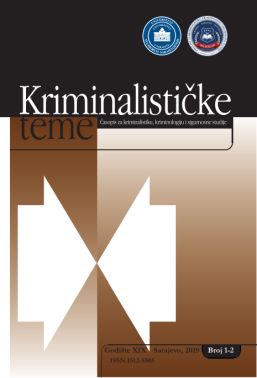UTJECAJ ORGANIZIRANOG KRIMINALA NA SIGURNOST DRŽAVA U TRANZICIJI
THE IMPACT OF ORGANIZED CRIME ON THE SECURITY OF STATES IN TRANSITION
Author(s): Amina SmailhodžićSubject(s): Criminal Law, International relations/trade, Security and defense, Criminology, Penal Policy
Published by: Fakultet za kriminalistiku, kriminologiju i sigurnosne studije Univerziteta u Sarajevu
Keywords: organized crime; security; transition; strategic planning; international cooperation;
Summary/Abstract: Reason for writing and research problem (s): Organized crime is one of the most complex phenomena in the world and the most serious problem of criminal legislation. This phenomenon is a challenge both for theory and practice. Adjusts to new trends. Organized crime jeopardizes the security of states by attacking vital interests. Because of the unstable social organization, the rapid transfer of crime from developed countries and countries in transition in which it is a major social problem, as well as the uneducated system of value, is evident in its growth. A successful fight against organized crime is possible with the application of contemporary technical achievements, as well as the firm determination of the state to fight organized crime. Activities to combat organized crime need to be directed at strategic planning and international cooperation. Aims of the paper (scientific and/or social): Handling this topic is done from a scientific and social point of view. The aim of the research is to present measures to counter organized crime in transition countries, to show the causes of organized crime and factors that are crucial to finding relevant facts of organized crime in transition countries. Methodology/Design: The paradigm that this research belongs to is positivism. Data collection methodology is based on qualitative and quantitative research. The methods used in this research are: method of document content analysis, statistical method, induction, deduction, abstraction. Research/Paper limitation: The main limitation of this paper is that the subject of the research is very complex and it is not possible to look at all aspects of the impact of organized crime. Results/Findings: The results would give a clear picture of how organized crime is affecting the security of states in transition, and then, based on these results, it could react to overcoming potential problems. General Conclusion: Strategic action and international cooperation aim to limit the consequences of organized crime. In order to strengthen the fight against all forms of organized crime, it is necessary to improve statistical methods and synchronization in the collection of police data at all levels of government in transition countries. Organized crime represents a threat and national security risk, which requires enhanced criminal intelligence and data exchange. The preventive form of combating organized crime encompasses various activities that reduce the scope for the commission of criminal offenses as well as activities that improve the social factors that prevent the emergence and development of organized crime.
Journal: Kriminalističke teme – Časopis za kriminalistiku, kriminologiju i sigurnosne studije
- Issue Year: XIX/2019
- Issue No: 1-2
- Page Range: 45-66
- Page Count: 22
- Language: Bosnian, Croatian, Serbian

